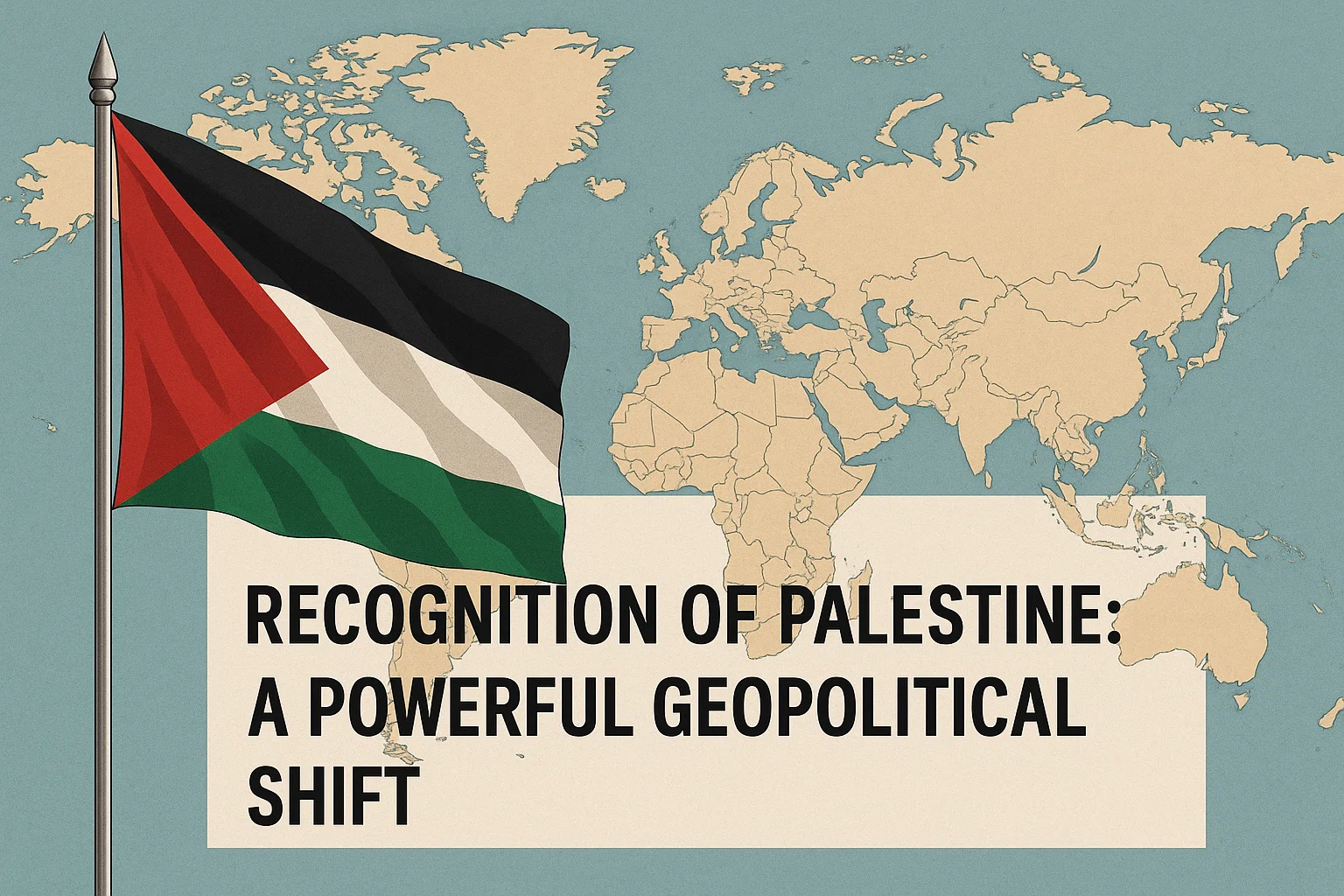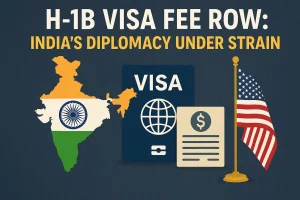Recognition of Palestine: A Powerful Geopolitical Shift
The recognition of Palestine by the UK, Canada, France, Portugal, Australia, and Belgium marks a historic geopolitical shift. This article explores the reasons behind recognition, the humanitarian crisis in Gaza, implications for global alliances, India’s balancing act between Israel and Palestine, and the future of the two-state solution.

Introduction
In a historic diplomatic shift, countries such as the UK, Canada, France, Portugal, Australia, and Belgium (expected) have formally recognised the State of Palestine. This marks a watershed moment in international politics, especially as Britain justified its move as an effort to “keep alive the possibility of peace.” The recognition comes amid one of the worst humanitarian crises in Gaza’s history, where over 65,000 deaths and mass displacement (as per UN OCHA, 2025) have pushed global powers to act.
This blog examines why recognition has come at this juncture, its geopolitical significance, its ties with India’s foreign policy, and its broader impact on the Middle East and beyond.
Why Are Countries Recognising Palestine Now?
1. Cautious European Stance in the Past
For decades, Europe’s stance on Palestine and the two-state solution was largely cautious. While many European nations supported UN resolutions calling for Palestinian rights, most refrained from outright recognition. Instead, they maintained diplomatic ties with Israel and advocated for a negotiated peace settlement. The belief was that recognition before a peace agreement might derail dialogue.
However, after decades of conflict and failed negotiations, that position has shifted. Western powers are now aligning with 150+ countries worldwide that already recognise Palestinian statehood, underscoring a belief that diplomacy must move forward rather than remain stalled.
2. Humanitarian Crisis in Gaza
The scale of destruction in Gaza has created immense international pressure. UN agencies report 65,000+ deaths, famine conditions, and forced displacement of millions. The UN Human Rights Council’s 2025 report even accused Israel of committing genocide, further intensifying demands for accountability.
This humanitarian catastrophe has made silence politically costly, particularly in liberal democracies where public opinion is swayed by images of suffering and grassroots protests. The recognition of Palestine is, therefore, both a humanitarian and political act.
3. Frustration with Israel’s Policies
Israel’s continued expansion of settlements in the West Bank is widely seen as undermining the two-state solution. Despite repeated UN Security Council Resolutions (242 & 338) calling for withdrawal from occupied territories, successive Israeli governments have pursued expansionist policies.
Western recognition of Palestine is thus a diplomatic signal against illegal occupation, reflecting a mounting frustration with Israel’s defiance of international law.
4. Domestic Political Pressures in the West
Recognition also stems from domestic compulsions. In the UK, Prime Minister Keir Starmer faced mounting demands within his Labour Party to adopt a firmer stance. Across Western capitals—London, Paris, Ottawa, Sydney—massive protests highlighted the famine and destruction in Gaza, pushing leaders to act.
Recognition became a way of responding to domestic political pressure while maintaining credibility in global diplomacy.
5. Historical Responsibility
For Britain, the decision has a historical context. The Balfour Declaration of 1917 promised a Jewish homeland but also protection for Palestinian rights. Palestinians argue that the latter promise was never fulfilled. Recognition is now presented as rectifying a colonial-era wrong, a symbolic but politically potent gesture.
6. Strategic Diplomatic Signalling
By joining 150+ countries that already recognise Palestine, these Western nations are signalling that the two-state solution is the only viable path to sustainable peace. It also demonstrates a willingness to diverge from U.S. policy, underlining a more independent European diplomatic line.
How does this tie with India’s stance?
- India recognised Palestine in 1988, while also maintaining ties with Israel since 1992.
- As per Economic Survey 2022-23, West Asia is vital for India’s energy security (over 60% crude imports) and remittances (~$90 bn annually from the Gulf).
- Hence, India balances support for Palestinian statehood with deepening defence and tech partnerships with Israel.
India’s Stance on Palestine and Israel
India recognised Palestine as a state in 1988, making it one of the earliest non-Arab countries to do so. At the same time, India established formal ties with Israel in 1992, pursuing a balancing strategy.
Importance of West Asia for India
-
Energy Security: Over 60% of India’s crude oil comes from West Asia.
-
Remittances: Gulf countries contribute around $90 billion annually through the Indian diaspora.
-
Strategic Partnerships: Defence and technology cooperation with Israel has deepened significantly in the past decade.
Thus, India walks a diplomatic tightrope—supporting Palestinian statehood on principle while nurturing strong ties with Israel. Recognition by more Western states strengthens India’s consistent position that peace must come through the two-state solution.
Geopolitical Implications of Palestine Recognition
1. Strain in Western Alliances
The recognition has exposed transatlantic rifts. U.S. President Donald Trump opposed Palestinian recognition, insisting that only direct negotiations could lead to peace. The divergence highlights weakening collective Western influence in the Middle East.
2. Escalation of Israeli Response
Israeli Prime Minister Benjamin Netanyahu threatened to annex more areas of the West Bank, deepening the crisis. Annexation would not only intensify conflict but could push Israel into deeper isolation, even among Western allies.
3. Boost to Palestinian Diplomacy
Recognition revives the legitimacy of the Palestinian Authority (PA), strengthening its hand in international forums like the UN, ICC, and the G77 group. It allows Palestine to leverage new diplomatic support in negotiations and humanitarian aid efforts.
4. Global South Solidarity
For decades, Palestine has enjoyed the support of Asian, African, and Latin American countries. Now, with Western recognition, Palestine’s diplomatic case strengthens further, particularly in the Global South coalition, potentially reshaping multilateral negotiations on development and humanitarian issues.
5. Regional Balance and Security Concerns
Some fear that recognition might embolden militant groups like Hamas, weakening moderates. However, others argue that recognition empowers moderate voices by strengthening the Palestinian Authority and providing a political alternative to armed resistance. In the long run, this may stabilise the region rather than destabilise it.
The New York Declaration
The New York Declaration (2025) is a key outcome accompanying recognition. It calls for “tangible, timebound, and irreversible steps” toward a two-state solution. This reflects an emerging consensus that symbolic gestures must be backed by practical policy measures—whether through aid, peace talks, or monitoring mechanisms.
Historical and Symbolic Weight of Recognition
Recognition is not merely a legal step. It is symbolically powerful, akin to recognising the legitimacy of a people’s struggle for self-determination. For Palestinians, it offers international validation of their identity and aspirations, after decades of war, displacement, and occupation.
For Israel, however, it is seen as an existential challenge that delegitimises its security arguments. This clash of narratives ensures that recognition will not end conflict immediately, but it shifts the diplomatic centre of gravity.
Conclusion
The recognition of Palestine by Western powers marks a geopolitical turning point. It reflects humanitarian urgency, political pressures, historical responsibilities, and strategic recalibrations. While risks of escalation remain, recognition restores momentum to the two-state solution, making it harder for the issue to be ignored in international diplomacy.
For India, the development validates its long-held position of supporting Palestinian statehood while balancing ties with Israel. In the larger picture, recognition represents not only a powerful symbolic gesture but also a practical diplomatic tool to revive hope for peace in one of the world’s most volatile regions.
Subscribe to our Youtube Channel for more Valuable Content – TheStudyias
Download the App to Subscribe to our Courses – Thestudyias
The Source’s Authority and Ownership of the Article is Claimed By THE STUDY IAS BY MANIKANT SINGH





